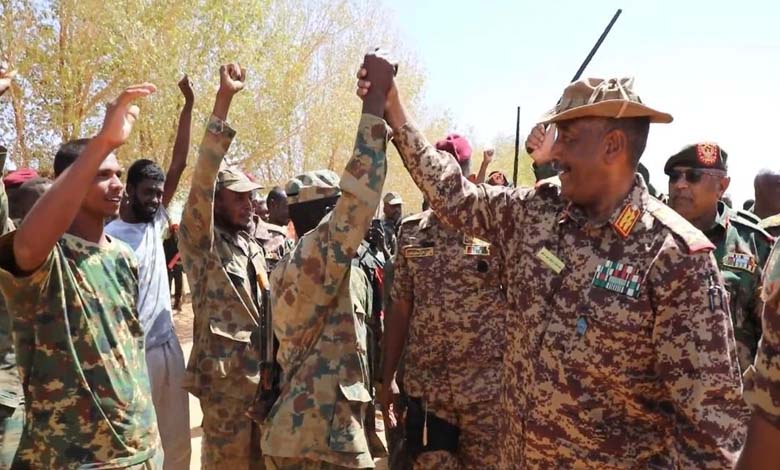Power and Influence Struggles: Infighting Rocks Sudanese Army Alliances

Behind the scenes of war, internal conflicts plague the Sudanese army‘s alliances—some driven by material interests, others rooted in regional tensions.
A Sudanese source in Port Sudan said rising tensions between the newly appointed Prime Minister of the army-backed government and key members of joint forces allied with the army, amid disputes over the upcoming cabinet formation in Port Sudan.
-
The Sudanese Army Under Scrutiny: Systematic Violations Against Civilians and Suspicions of Chemical Weapons Use
-
Political Blackmail and Islamist Dominance over the Sudanese Army: No to War, Yes to Revolution
According to the source, Prime Minister Kamel Idriss faces a significant challenge in forming the new government, which army leaders intend to use to reshape their alliances with signatories of the Juba Peace Agreement from October 2020.
The Sudan Liberation Movement led by Minni Minnawi and the Justice and Equality Movement led by Jibril Ibrahim have both insisted on retaining the executive positions they held during the transitional period, rights they say were guaranteed by the peace deal.
-
Sudanese Army Under Fire: Allegations of Civilian Abuses and Obstruction of Humanitarian Aid Amid International Calls to End the War
-
Sudanese Army Issues New Decision Banning Recruitment Operations for Allied Armed Movements
The two groups refuse to relinquish these roles, while Kamel Idriss seeks to implement the military’s directives to significantly restructure the executive branch—including ministries previously allocated to armed movements under the Juba agreement.
Jibril Ibrahim has held the post of Finance Minister since the transitional government led by Abdalla Hamdok, prior to the October 2021 military coup. Meanwhile, the Sudan Liberation Movement holds the Ministry of Minerals, led by senior figure Mohamed Bashir Abou Namo, while Minnawi serves as governor of Darfur.
-
Escalation of Tensions Between Sudanese Army Leaders and Islamist Militias: What Are the Causes?
-
Crisis of Trust between the Sudanese Army and Its Militias… What Lies Behind the Recruitment Freeze Decision?
Dispute Over Finance and Mining
The source said army leaders are under heavy pressure from influential Islamist figures and allied factions to seize control of the Finance and Minerals ministries, aiming to ensure full control of economic resources.
The new plan envisions placing the two ministries under direct army oversight through civilian appointees selected in consultation with Idriss.
-
Khartoum: Liberation or Genocide? Sudanese Army Accused of War Crimes
-
The Muslim Brotherhood’s Congratulations to the Sudanese Army… A Move That Reveals the Group’s Role in Fueling the Conflict
The source attributes this strategy to the worsening economic crisis, as Port Sudan authorities struggle to keep state functions running and cover war-related expenses due to the collapse of major natural resource sectors.
With gold as the main income source, Jibril and Minnawi now wield considerable power over economic influence and decision-making in Port Sudan.
Tribal groups supporting the army in eastern, central, and northern Sudan have also expressed dissatisfaction with Jibril and Minnawi’s hold on the two ministries, particularly given the war’s erosion of the Juba agreement’s relevance.
-
Khartoum’s Liberation Exposes Alliances: Muslim Brotherhood’s Congratulatory Message to the Sudanese Army Raises Questions
-
The Muslim Brotherhood’s Congratulations to the Sudanese Army for the Liberation of Khartoum: A Reading of Political and Military Dimensions
Regional Power Struggles
The issue intensified following the defection of Sudan Shield Forces leader Abu Aqla Kikel from the Rapid Support Forces to the army. Since then, Kikel has reportedly enjoyed privileged treatment from army chief Abdel Fattah al-Burhan, especially after his forces helped retake Al-Jazira State in January 2025.
Following that, bloody events in Kombo Tayba raised accusations of “ethnic cleansing” targeting the Kanabi community—mostly Darfuri—under claims of supporting the RSF. Sudan Shield Forces were blamed, though Kikel denied involvement.
-
The Sudanese Army Committed Horrific Field Executions in Khartoum
-
Human Rights Organizations: Sudanese Army Involved in Summary Executions That Have Claimed Dozens of Civilian Lives
In response, Jibril and Minnawi’s movements expressed solidarity with the Kanabi and pledged to protect them from such violence.
Despite Kikel’s denials, tension remains between him and the armed groups. According to reports, Minnawi left a recent cabinet meeting chaired by Kamel Idriss as soon as he noticed Kikel’s presence.
-
Sudanese Army’s Threats to its Neighbors: An Internal Distraction Signaling Regional Dangers
-
Sudanese Army’s Military Gains Undermine Chances of a Peaceful Resolution to the Crisis
Other Juba peace signatories—such as Central Track, the Northern Entity, Kikel’s forces, and some eastern Sudanese groups—have voiced objections to Jibril and Minnawi’s insistence on keeping their ministerial posts, possibly due to shifting regional alliances amid the war.
On Tuesday, the Justice and Equality Movement, headed by Jibril Ibrahim, reaffirmed its full commitment to the Juba Peace Agreement, including its ministerial entitlements.
-
The Sudanese Army and the Use of Chemical Weapons: Recent War Violations and Humanitarian Impact
-
Sudanese Army Violations Against Civilians: War Crimes Threatening the Country’s Future
-
The Sudanese Army’s Reliance on Mercenaries and Foreign Forces: The Collapse of Local Military Capabilities











